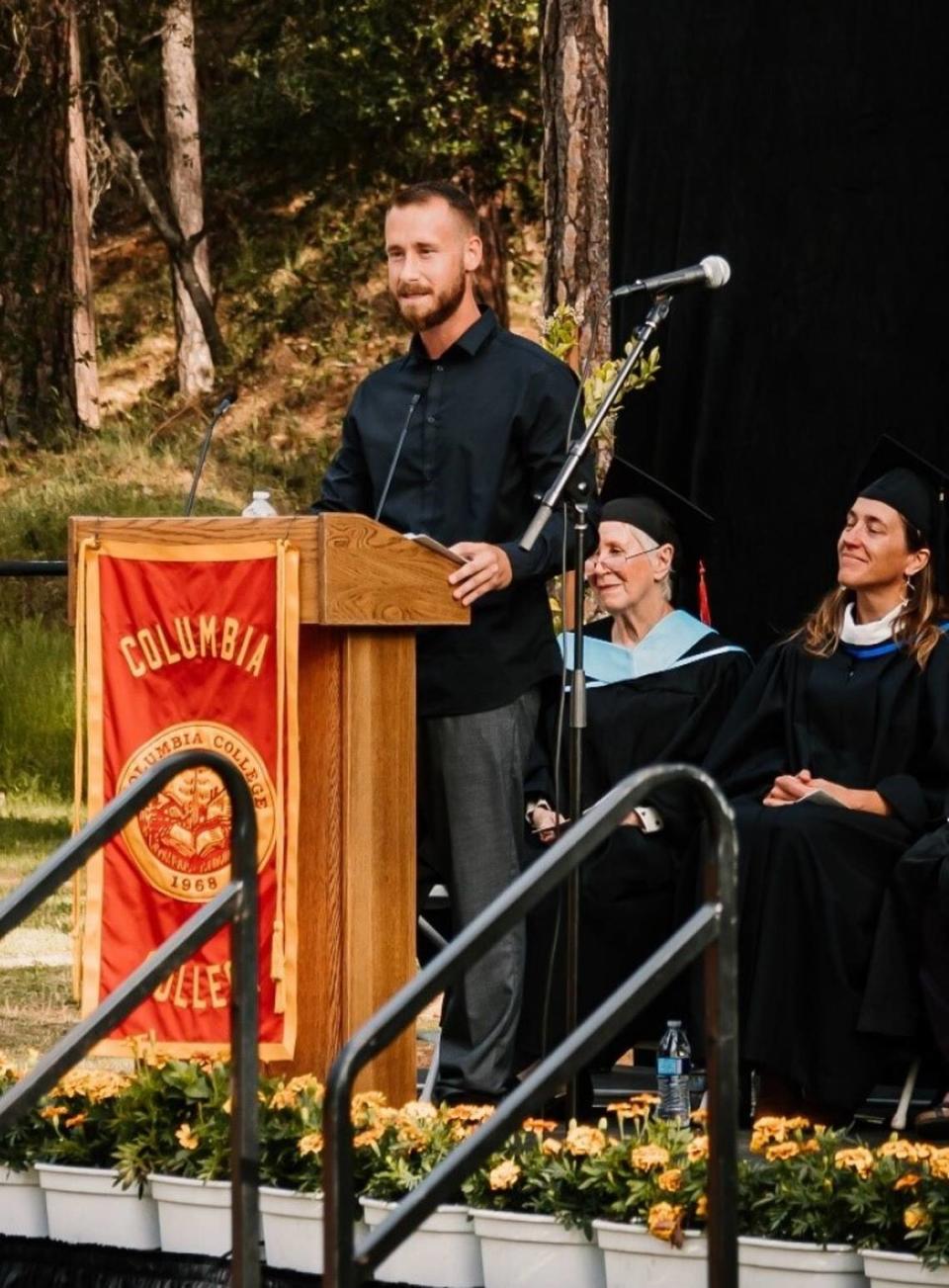College’s program takes education behind bars. Why it’s recognized as a model for California
At the age of 15, Lance Stark experienced homelessness after his parents died. He decided to join the Marines as a way to go to college. After serving in Afghanistan, however, he was diagnosed with post-traumatic stress disorder and became incarcerated.
While in prison, he found the path to college when he had the opportunity to study in Columbia College’s Rising Scholars program and return later as a commencement speaker.
Columbia College’s Rising Scholars is among select community college programs leading California’s efforts to improve education programs for incarcerated individuals. Columbia is part of the Rising Scholars Network, comprising 59 community colleges across the state. Modesto Junior College is in the network, working with the California Health Care Facility and Stanislaus County Juvenile Probation.
As part of the “Vision 2030 Rising Scholars Demonstration Project,” Columbia’s program will be among up to six statewide showcasing best practices and efforts to help incarcerated students earn college certificates and degrees as they transition back into society.
Stark, 32, is now a full-time California State University, Fullerton, student and works in providing social and reentry services to incarcerated individuals.
“I don’t think that I would be where I’m at or be who I am today. The door that [Rising Scholars] opened, the healing that it provided to me, was priceless,” Stark said.
Programs were selected for the demonstration project because of their “substantial contributions” in enrolling incarcerated individuals in college courses, according to the California Community College Chancellor’s office.
“This is a tremendous honor from the state chancellor’s office and recognizes many years of outstanding work by our Rising Scholars team and our partners at Sierra Conservation Center,” said Columbia College President Lena Tran. SCC is a state prison near Jamestown.
“Incarcerated students face some of the most difficult barriers and we are dedicated to assisting them in transitioning into productive lives as they are released,” Tran said.
Columbia has helped hundreds of inmates annually for nearly a decade
Since 2015, Columbia College has been offering classes at prisons, and academic guidance and services to hundreds of incarcerated individuals annually. This initiative operates in partnership with SCC and its affiliated fire camps.
Tran said that finding a job is tough with a prison record, especially without an education or skills. So, this program helps level the playing field for vulnerable groups like those formerly incarcerated.
Columbia College also recently received a $1.5 million grant to start working with juvenile justice.
Michelle Walker, director of external initiatives at Columbia College and overseer of the school’s program, said being selected for the demonstration project shows that years of work have culminated in success that is identifiable.
Yosemite Community College District Chancellor Dr. Henry Yong said in a news release that supporting education of the incarcerated helps reduce recidivism. Research from the American Journal of Criminal Justice shows that prison education decreases recidivism and increases post-release employment and wages. While more research is ongoing, Walker finds that that education is transformative for their students.
Rising Scholars originated in 2014 with the passing of SB 1391, aiming to offer educational and career technical opportunities to incarcerated individuals, enhancing job skills and employability upon reentry into society.
The program now accommodates over 250 students each semester, many of whom enroll in multiple classes. Courses typically run the same length as Columbia College’s academic calendar during fall and spring, with the exception of the courses taught at the fire camps, which run in 10-week cohorts. Summer courses typically run 10 to 12 weeks.
Rising Scholars ‘have freedom in their mind’
Students not only can fulfill general education requirements but also prepare to transfer if they aspire to pursue a bachelor’s degree post-release.
Walker said that Rising Scholars has a person-centered approach and views education as a form of freedom. “They might not have bodily freedom, but they have freedom in their mind,” Walker said.
Students in the program are provided with resources akin to those available to community college students, including academic counseling, tutoring and workshops on college skills, such as essay writing and laptop usage. For many incarcerated individuals, especially those who have been detained for extended periods, the program serves as their first exposure to technology.
Most courses offered within the program are complemented by career counseling, ensuring students are equipped with the necessary skills and guidance for their desired employment opportunities post-release.
Following their release, the majority of Columbia’s program participants typically return to their hometowns. A newly enacted law, however, now provides individuals released from prison with relocation options tailored to educational, treatment, housing or employment opportunities. Walker said she hopes that more students from the program will have the opportunity to return to the Columbia College campus post-release, should they wish to remain in the area.

Learning behind prison walls has its own challenges
During Stark’s three years in the program, he volunteered as a math tutor and said his favorite part was his math classes.
Although it was hard to focus in a noisy and chaotic environment, like the prison, he said he found support within his cohort and the staff.
He credits the faculty for coming into a high security prison yard, which can be intimidating to most, to deliver them their education.
Marcus Whisenant, an instructor of sociology at the program, said he particularly enjoys working with the incarcerated population.
His students, whom he calls his “rising scholars,” always look excited to be there and are eager to talk about the readings and class material.
“Sociology and talking about being incarcerated leads to some very excellent talks,” Whisenant said.
Having previously taught juveniles, he felt more prepared for this program. He has even requested to teach over the summer as well.
“It was just one of those things where I kept asking to be placed out there.”

